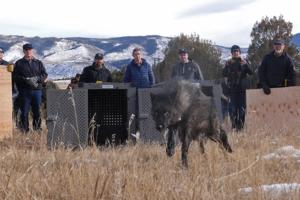Current News
/ArcaMax

Sen. Dave McCormick has been making friends -- from Trump to Fetterman -- and building influence in Washington
PHILADELPHIA — President Donald Trump’s first visit to Pennsylvania this year came in March at the invitation of Sen. Dave McCormick.
As the two sat mat-side at the Wells Fargo Center watching college wrestlers grapple, McCormick brought up an issue he was eager to discuss.
The Japanese company Nippon Steel wanted to acquire U.S. Steel, ...Read more

Trump sues to end college tuition benefits for undocumented students. Could California be next?
For 24 years, immigrants lacking documentation who graduated from high school in California have received in-state tuition benefits at public colleges and universities under a law that has given tens of thousands access to higher education that many couldn't otherwise afford.
When the California Legislature passed Assembly Bill 540 in 2001, it ...Read more

Heartbreak estate: Inside the legal battles of Elvis Presley's financial legacy
In the summer of 2021, Priscilla Presley seemed to be riding high.
The ex-wife of the King of Rock 'n' Roll had appeared at Graceland during the annual Elvis Week celebration and later hosted a three-day festival at the famous manse extolling the virtues of elegant Southern living. Then there were the highly anticipated upcoming biopics: ...Read more

'I'm not going anywhere': For 1 Altadena fire survivor, the math makes sense to rebuild
LOS ANGELES — Jennie Marie Mahalick Petrini has a big decision on her hands.
For Petrini, the night of Jan. 7 brought total loss. The Eaton fire decimated her quaint home in the northwest corner of Altadena near Jane's Village, reducing her sanctuary to a pile of rubble.
"I have a spiritual connection to that house," she said. "It was the ...Read more

Despite moves by Indiana lawmakers, Illinois' borders are unlikely to change. Here's why
CHICAGO — Don’t hold your breath, Hoosiers.
The nearly three dozen Illinois counties where a majority of voters in recent years have expressed their desire to leave the Land of Lincoln won’t be joining their neighbor to the east anytime soon — or probably ever — regardless of any recommendation from a bistate commission Indiana Gov. ...Read more

Colorado universities brace for plunge in international students due to fears sparked by Trump policies
DENVER — Colorado universities are bracing for major disruptions to their international student populations this fall in light of federal hostility toward foreign-born students and rapidly shifting immigration policies from the Trump administration.
More than 10,360 international students attended colleges and universities in the Centennial ...Read more

How Rep. Lauren Boebert's bill to delist gray wolves would affect Colorado's wolf reintroduction
DENVER – For decades, the question of how and whether gray wolves should be legally protected has been debated through federal rulemakings, courts and now Congress — where a bill from one of Colorado’s representatives is under consideration.
U.S. Rep. Lauren Boebert is leading a bill that would remove the gray wolf from the endangered ...Read more

'Above-normal fire potential': San Diego Gas & Electric prepares for peak wildfire season
SAN DIEGO — Buckle up for another potentially dangerous peak wildfire season in the San Diego area.
“We’ve only had about 50% of the normal rainfall, and temperatures are expected to be warm as we get into this summer,” Brian D’Agostino, meteorologist and vice president of wildfire and climate science at San Diego Gas & Electric, said...Read more

NC Senate set to take up Gov. Josh Stein's immigration and gun bill vetoes
State lawmakers are expected to begin the effort to override Gov. Josh Stein’s vetoes of two major immigration and gun bills on Monday night or Tuesday.
That’s when the two measures, Senate Bill 50 and Senate Bill 153, could receive the first of two required override votes in the Senate.
A top Republican leader in the Senate notified the ...Read more

Harvard wins longer block on Trump's foreign student ban
A federal judge issued another court order letting Harvard University keep hosting foreign students, this one in its fight to overturn President Donald Trump’s proclamation barring their entry to the U.S.
US District Judge Allison Burroughs granted the university a preliminary injunction Monday that prevents the government from enacting a ...Read more

L.A. cops retract 'offensive' social media post sympathetic to Iranians
The Los Angeles County Sheriff’s Department apologized for a social media post expressing sympathy for Iranians impacted by U.S. and Israeli bomb strikes.
The nation’s largest Sheriff’s department posted a message Sunday assuring residents that law enforcement was exercising vigilance following a U.S. attack on Iranian nuclear facilities ...Read more
Lake Tahoe boating tragedy: Big waves, cold water, strong winds created deadly conditions
Every summer thousands of people head to rivers, lakes and coastal areas in California — from San Diego to the Sierras, Shasta Lake to Monterey Bay — to enjoy the water as the weather warms.
Accidents are rare. But as Saturday’s heart-breaking episode demonstrated at Lake Tahoe, where seven people drowned when their 27-foot Chris-Craft ...Read more

Evidence depicting Sean 'Diddy' Combs' debauched lifestyle admitted as feds wrap up NYC sex trafficking case
NEW YORK — A tranche of electronic evidence shedding light on Sean “Diddy” Combs’ debauched lifestyle was admitted into evidence Monday as prosecutors wrapped up their sex trafficking and racketeering case against the jailed rap mogul.
Feds at the Manhattan U.S. attorney’s office spent what’s slated to be the last full day of their ...Read more
8th body found from fatal Tahoe boat flip during rare June storm surge Saturday
SACRAMENTO, Calif. — At noon Saturday, the wind blew at just 7 mph, with gusts of 11 mph, at one buoy near the center of Lake Tahoe. By 3 p.m., the wind speed reached 29 and gusts hit 45, according to National Weather Service data.
It was at approximately that time that the day after the summer solstice on North America’s largest alpine ...Read more

Bondi defends Justice Department proposal to end standalone ATF
WASHINGTON — Attorney General Pamela Bondi on Monday defended a Trump administration proposal to eliminate the Bureau of Alcohol, Tobacco, Firearms and Explosives, a major shakeup experts say would likely require congressional action to implement.
The Justice Department in a fiscal 2026 budget request has outlined a plan to merge ATF ...Read more

Trump announces tentative ceasefire between Israel and Iran
President Donald Trump announced Israel and Iran had agreed to what he called a “complete and total” ceasefire, easing fears that a conflict between the two adversaries might escalate.
Trump, who made the surprise announcement on his Truth Social platform days after ordering airstrikes on Iran’s nuclear facilities, said the accord would ...Read more

Trump administration moves to rescind Roadless Rule, potentially setting stage for expanded harvests in Tongass National Forest
ANCHORAGE, Alaska — The Trump administration said Monday that it plans to rescind the Roadless Rule to remove restrictions on timber harvests and road-building in national forests, including the Tongass National Forest in Southeast Alaska.
The move drew swift condemnation, including in Alaska where conservation groups and some village leaders...Read more

Major insurers pledge to improve preauthorization
WASHINGTON — The nation’s largest insurers and insurance industry groups agreed to address problems caused by prior authorization, though Health and Human Services Department officials who announced the handshake deal on Monday acknowledged they may need to take additional regulatory action.
Health plans often require additional ...Read more

California Gov. Newsom's legal fight against Trump continues over Guard troops in LA
SACRAMENTO, Calif. — Lawyers for California Gov. Gavin Newsom continued their court battle on Monday against President Donald Trump’s deployment of the National Guard and other military personnel to Los Angeles during protests over immigration raids.
The case is the latest flash point between the Democratic governor and the Republican ...Read more

As budget talks stall, NC Senate comes up with a funding stopgap -- for now
North Carolina Senate lawmakers on Monday transformed a bill about the state star into a 44-page measure that funds agencies and programs, as budget talks with the House remain stalled.
The bill could be on the Senate floor as soon as Monday night.
Senators also unveiled their reworked version of a House bill to fund more aid in Western North ...Read more
Popular Stories
- Iran launches missiles at US bases in retaliatory strike
- 'Alligator Alcatraz' for deportations could devastate Everglades, Miami-Dade mayor says
- White House walks back Trump 'Make Iran Great Again,' regime change calls
- Detained man would rather return to Venezuela than remain in harsh conditions at Florida's Krome detention center
- Tornado kills 3 in upstate NY, including twin 6-year-old girls





